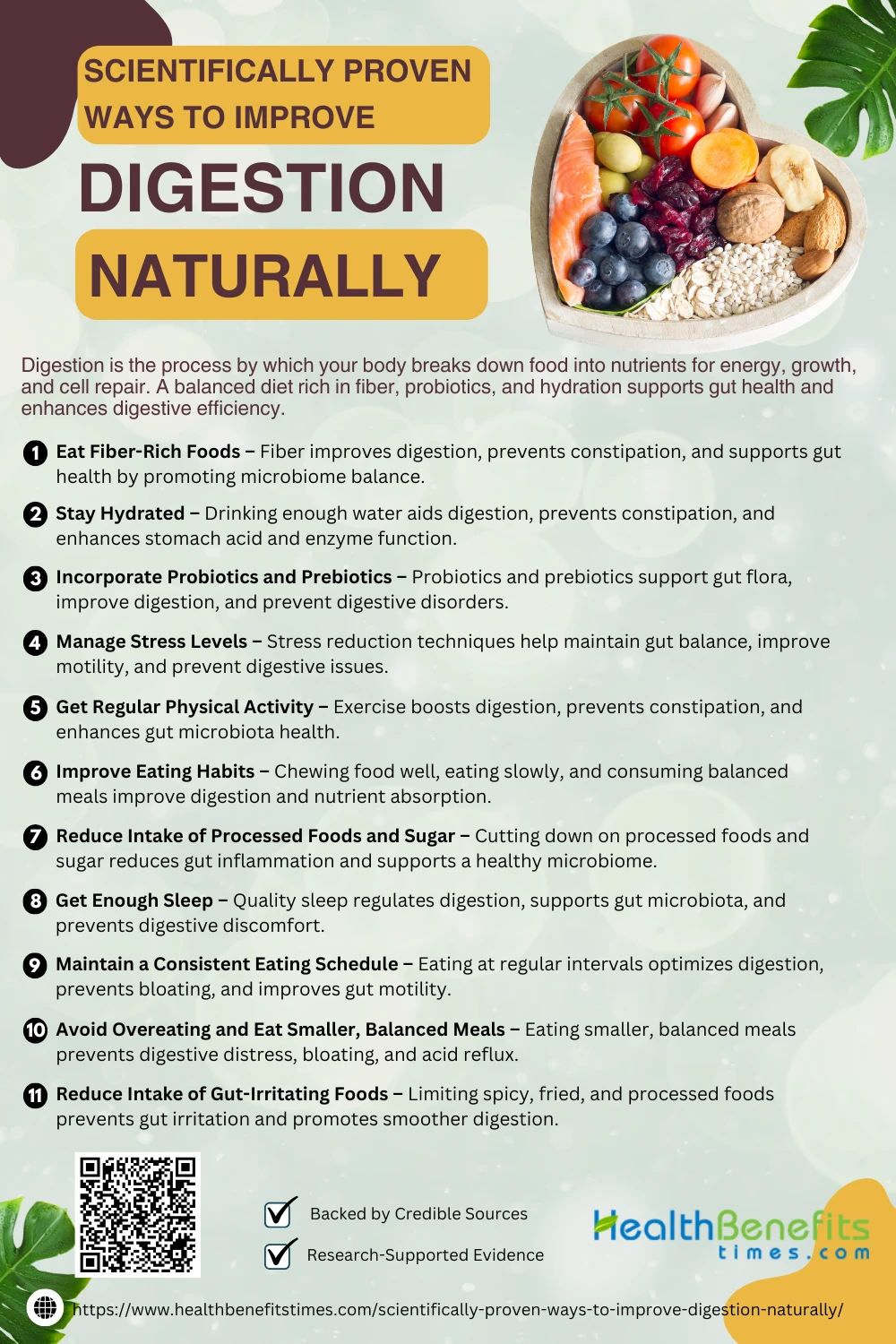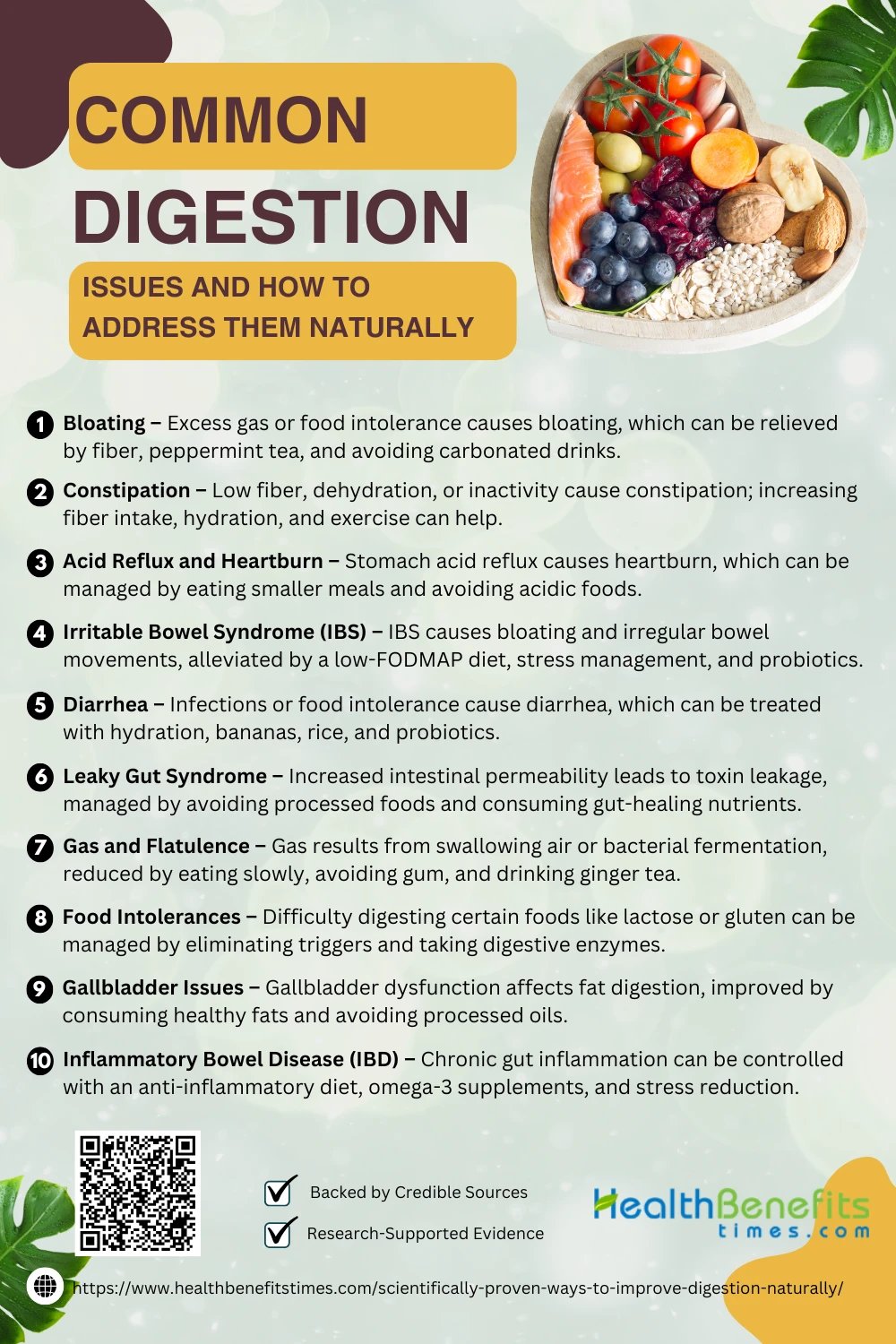- Digestion is the process by which your body breaks down food into nutrients for energy, growth, and cell repair.
- A balanced diet rich in fiber, probiotics, and hydration supports gut health and enhances digestive efficiency.
- Lifestyle habits like mindful eating, regular physical activity, and stress management play a crucial role in maintaining optimal digestion.
 Digestion is the complex biological process by which the body breaks down food into nutrients that can be absorbed and utilized for energy, growth, and cell repair. A well-functioning digestive system is essential for overall health, as it ensures the efficient breakdown and absorption of nutrients while supporting a balanced gut microbiome. Scientific research highlights the significant role of dietary choices, lifestyle habits, and gut microbiota in improving digestion naturally. A fiber-rich diet, for instance, has been shown to enhance gut motility and support beneficial bacteria, reducing the risk of common digestive disorders. Similarly, adequate hydration is crucial for maintaining optimal digestive function, preventing constipation, and ensuring smooth food passage through the intestines.
Digestion is the complex biological process by which the body breaks down food into nutrients that can be absorbed and utilized for energy, growth, and cell repair. A well-functioning digestive system is essential for overall health, as it ensures the efficient breakdown and absorption of nutrients while supporting a balanced gut microbiome. Scientific research highlights the significant role of dietary choices, lifestyle habits, and gut microbiota in improving digestion naturally. A fiber-rich diet, for instance, has been shown to enhance gut motility and support beneficial bacteria, reducing the risk of common digestive disorders. Similarly, adequate hydration is crucial for maintaining optimal digestive function, preventing constipation, and ensuring smooth food passage through the intestines.
Incorporating probiotics and prebiotics into one’s diet has been scientifically validated to improve gut flora balance, aiding in digestion and boosting immune function. Stress management is also crucial, as excessive stress can negatively impact digestion through the gut-brain axis, exacerbating conditions such as irritable bowel syndrome (IBS). Additionally, engaging in regular physical activity has been linked to improved gut motility and a lower risk of digestive disorders. Beyond dietary and lifestyle interventions, natural digestive aids like ginger, peppermint, and turmeric have demonstrated effectiveness in alleviating common digestive issues such as bloating, gas, and acid reflux. Moreover, getting sufficient sleep plays a crucial role in maintaining a healthy gut microbiome, as sleep deprivation has been linked to increased gut inflammation and dysbiosis.
Scientifically Proven Natural Ways to Improve Digestion
Good digestion is key to overall health, yet many struggle with bloating, indigestion, or constipation. Discover scientifically proven natural methods to enhance digestion, boost gut health, and improve nutrient absorption effortlessly.
1. Eat Fiber-Rich Foods
Consuming fiber-rich foods plays a vital role in improving digestion by promoting gut motility and preventing constipation. Fiber helps regulate bowel movements and supports a healthy gut microbiome. (1) Soluble fiber, found in oats, beans, and apples, forms a gel-like substance that aids digestion, while insoluble fiber from whole grains and vegetables adds bulk to stool, easing its passage. (2) Studies show that a high-fiber diet reduces the risk of digestive disorders such as irritable bowel syndrome (IBS) and diverticulitis. (3) Additionally, fiber-rich diets contribute to a balanced gut microbiota, enhancing nutrient absorption and reducing inflammation in the intestines. (4) For optimal digestive health, experts recommend a daily intake of at least 25-30 grams of fiber through whole foods. (5)
2. Stay Hydrated
Water is essential for digestion, as it helps break down food and transport nutrients throughout the body. (6) Proper hydration prevents constipation by softening stool, making it easier to pass through the intestines. (7) Research suggests that drinking enough water enhances stomach acid production and digestive enzyme activity, improving food breakdown. (3) Hydration also supports the body’s natural detoxification process by flushing out waste and harmful bacteria from the digestive tract. (8) Maintaining adequate fluid levels—preferably through water and herbal teas—reduces bloating and promotes efficient digestion. (9)
3. Incorporate Probiotics and Prebiotics
Probiotics and prebiotics support gut health by promoting beneficial bacteria, improving digestion, and enhancing nutrient absorption. Probiotics, such as Lactobacillus and Bifidobacterium, aid in breaking down food and maintaining gut balance. (10) Prebiotics, found in garlic, bananas, and onions, serve as food for these beneficial bacteria, improving gut flora diversity. (11) Studies suggest that incorporating probiotics reduces bloating, enhances digestion, and prevents diarrhea. (12) Furthermore, research indicates that probiotics can help manage inflammatory bowel diseases and irritable bowel syndrome (IBS). (13) Regular consumption of probiotic-rich foods like yogurt, kefir, and sauerkraut, along with prebiotics, can significantly enhance gut health and digestion. (3)
4. Manage Stress Levels
Chronic stress disrupts the gut-brain axis, leading to digestive disorders like IBS and acid reflux. Stress management techniques, such as meditation and deep breathing, help regulate gut function and improve digestion. Studies show that high stress levels increase gut inflammation and disrupt microbiota balance. (14) Engaging in relaxation activities like yoga has been proven to enhance gut motility and alleviate digestive discomfort. (15) Stress hormones such as cortisol negatively impact gut bacteria, reducing digestive efficiency. (5) Implementing stress reduction strategies, including exercise and sufficient sleep, plays a crucial role in maintaining a healthy digestive system. (16)
5. Get Regular Physical Activity
Regular physical activity stimulates digestion by promoting intestinal motility and reducing bloating. Exercise, such as walking and yoga, has been shown to accelerate food transit through the gastrointestinal tract, preventing constipation. (17) Studies indicate that movement enhances gut microbiota composition, fostering a healthier digestive system. (18) Engaging in at least 30 minutes of moderate-intensity exercise daily significantly improves digestion and reduces gastrointestinal discomfort. (19) Additionally, physical activity lowers stress levels, which indirectly supports digestive efficiency. (20) Implementing a consistent workout routine is a natural, science-backed way to maintain optimal gut health.
6. Improve Eating Habits
Adopting healthier eating habits enhances digestion by ensuring the proper breakdown and absorption of nutrients. Eating slowly and chewing food thoroughly improves enzymatic activity and reduces bloating. (8) Research highlights that mindful eating prevents overeating, allowing the digestive system to function efficiently. (21) Studies also suggest that consuming smaller, balanced meals at regular intervals prevents digestive distress and acid reflux. (22) A diet rich in unprocessed, whole foods promotes gut health by reducing inflammation and maintaining microbiome diversity. (23) Avoiding excessive intake of processed foods and artificial additives is a proven strategy for optimizing digestion and overall well-being. (24)
7. Reduce Intake of Processed Foods and Sugar
Cutting back on processed foods and added sugars significantly improves digestion by reducing gut inflammation and balancing microbiota. High sugar intake promotes harmful bacteria overgrowth, leading to bloating and discomfort. (25) Studies show that artificial additives and preservatives in processed foods disrupt gut function and contribute to digestive disorders. (26) Reducing sugar consumption enhances gut motility and prevents constipation by encouraging a healthier microbiome. Whole, unprocessed foods contain essential fiber and nutrients that promote smoother digestion and absorption. (27) Transitioning to a diet rich in whole grains, fresh vegetables, and natural proteins supports a healthier gut environment and overall well-being. (5)
8. Get Enough Sleep
Adequate sleep is essential for maintaining a healthy gut microbiome and promoting efficient digestion. Research indicates that poor sleep disrupts the gut-brain axis, leading to digestive issues such as bloating and irregular bowel movements. (28) Sleep deprivation has been linked to increased inflammation in the gut, affecting digestion and nutrient absorption. (14) Studies suggest that a consistent sleep schedule improves gut motility and balances microbial diversity, reducing gastrointestinal discomfort. (29) The body’s natural circadian rhythm plays a critical role in regulating digestive functions, emphasizing the importance of quality sleep. Prioritizing 7-9 hours of sleep per night is a simple yet effective way to improve digestion and overall gut health. (23)
9. Maintain a Consistent Eating Schedule
Eating meals at regular intervals supports digestive function by regulating gastric acid production and enzyme secretion. Studies suggest that irregular eating patterns disrupt gut microbiota and slow digestion. (30) A consistent eating schedule promotes better digestion and nutrient absorption, reducing the risk of bloating and acid reflux. Research highlights that aligning meal times with circadian rhythms optimizes gut motility and prevents metabolic disorders. (5) Additionally, maintaining structured meal times reduces unnecessary snacking, which can lead to digestive imbalances. (24) Ensuring a consistent eating pattern is a simple yet powerful strategy for improving digestive health and overall well-being. (31)
10. Avoid Overeating and Eat Smaller, Balanced Meals
Consuming smaller, well-balanced meals prevents digestive discomfort, bloating, and acid reflux. Research suggests that overeating overwhelms the digestive system, leading to sluggish digestion and increased gut inflammation. (32) Studies indicate that smaller meals enhance nutrient absorption and maintain stable blood sugar levels, promoting gut efficiency. (33) Eating in moderation prevents excessive gastric acid production, reducing the risk of acid reflux and heartburn.
11. Reduce Intake of Gut-Irritating Foods
Limiting gut-irritating foods such as spicy, fried, and highly processed items promotes better digestion and reduces gastrointestinal inflammation. Research highlights that high-fat and heavily processed foods disrupt gut microbiota and slow digestion. (34) Artificial additives and preservatives in processed foods contribute to bloating and digestive discomfort. (35) Avoiding excessive sugar intake supports a healthier gut environment and prevents dysbiosis. (36) Studies suggest that reducing alcohol and caffeine consumption minimizes gut irritation and enhances digestive enzyme activity. (37) Opting for whole, nutrient-dense foods like fruits, vegetables, and lean proteins improves digestion and prevents common gut-related issues.
Common Digestive Issues and How to Address Them Naturally
Digestive issues like bloating, constipation, and acid reflux are common. Learn natural, science-backed solutions to improve gut health and restore balance.
- Bloating
Bloating occurs due to excessive gas or food intolerance, leading to abdominal discomfort. Natural remedies include increasing fiber intake, drinking peppermint tea, reducing carbonated drinks, and avoiding artificial sweeteners. - Constipation
Constipation results from low fiber intake, dehydration, or inactivity. Consuming high-fiber foods, drinking more water, and engaging in daily exercise can naturally improve bowel movements and alleviate discomfort. - Acid Reflux and Heartburn
Acid reflux occurs when stomach acid moves into the esophagus, causing burning sensations. Eating smaller meals, avoiding acidic foods, and elevating the head during sleep can help manage symptoms naturally. - Irritable Bowel Syndrome (IBS)
IBS leads to abdominal pain, bloating, and irregular bowel movements. A low-FODMAP diet, stress management techniques, and probiotics have been proven to alleviate symptoms and regulate digestion naturally. - Diarrhea
Diarrhea results from infections, food intolerance, or digestive disorders. Drinking plenty of fluids, eating bananas and rice, and taking probiotics can help restore gut balance and prevent dehydration. - Leaky Gut Syndrome
Leaky gut occurs when intestinal permeability increases, allowing toxins into the bloodstream. Avoiding processed foods, consuming collagen-rich foods, and taking glutamine supplements can improve gut barrier function naturally. - Gas and Flatulence
Gas and flatulence are caused by swallowing air or bacterial fermentation in the gut. Avoiding gum, eating slowly, and drinking ginger tea can significantly reduce discomfort and promote digestion. - Food Intolerances
Food intolerances result from the body’s inability to digest certain foods, such as lactose or gluten. Eliminating trigger foods, taking digestive enzymes, and keeping a food diary can help manage symptoms. - Gallbladder Issues
Gallbladder dysfunction can cause difficulty digesting fats and trigger pain. Eating healthy fats, drinking apple cider vinegar, and avoiding processed oils can naturally support gallbladder function. - Inflammatory Bowel Disease (IBD)
IBD is a chronic digestive disorder causing inflammation and discomfort. An anti-inflammatory diet, omega-3 supplements, and stress reduction techniques help manage symptoms and improve gut health.
When to Seek Medical Advice
Persistent digestive issues like chronic bloating, constipation, or unexplained weight loss may indicate underlying health conditions that require medical attention. Symptoms such as severe abdominal pain, blood in the stool, or frequent acid reflux should not be ignored, as they could signal serious gastrointestinal disorders. (38) Delayed diagnosis of conditions like celiac disease, Crohn’s disease, or peptic ulcers can lead to complications. (39) If lifestyle changes and dietary modifications fail to alleviate symptoms, consulting a healthcare professional is essential to prevent long-term digestive damage. (40) Conditions like gastric varices or intestinal blockages often require immediate intervention to avoid severe consequences. (41) Seeking timely medical advice ensures early diagnosis and effective treatment of digestive disorders, improving long-term health outcomes. (42)
Conclusion
Improving digestion naturally is achievable with simple, science-backed lifestyle changes. By eating fiber-rich foods, staying hydrated, managing stress, and supporting gut health with probiotics and exercise, you can enhance digestion and overall well-being. Consistency is key—small, sustainable habits lead to long-term digestive health. If issues persist, consulting a healthcare professional can help tailor solutions to your needs. Start implementing these natural strategies today for a healthier, happier gut.




